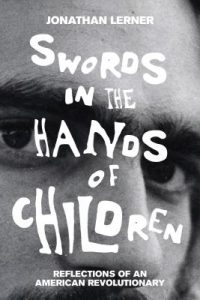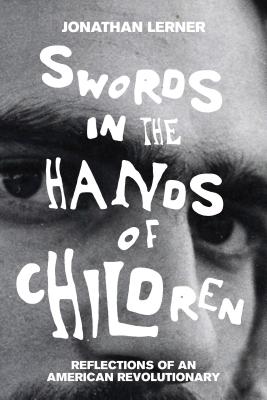 Swords in the Hands of Children:
Swords in the Hands of Children:
Reflections of an American Revolutionary
by Jonathan Lerner
OR Books. 216 pages, $22.
THE WORDS “fear” and “frightened” pepper Jonathan Lerner’s intriguing account of how he, a young idealist with a sincere commitment to the civil rights and peace movements of the 1960s, became affiliated with the violence-prone Weather Underground Organization (WUO).
In his youth, the closeted Lerner held back from a potential acting career because “the ubiquitous and openness of gay people in theater frightened me.” He recounts an experience at a major anti-war march in 1968, where there was a confrontation between demonstrators and police in riot gear, and reveals his fear of “those swinging truncheons.” Once immersed as a soldier in the Weather Underground, whose leaders turned authoritarian and cruel, Lerner became fearful of his comrades. Decades later, he has written a memoir about this era titled Swords in the Hands of Children. Having observed how some alumni of the WUO show little or no remorse, and given my own strong opposition to the group, I admire Lerner’s courage and honesty in writing this book filled with his own remorse and regret. The WUO, or Weathermen, as they were called, started as a faction in the Students for a Democratic Society (SDS), the national antiwar organization that both Lerner and I belonged to in the ’60s. The WUO, in an effort to combat imperialist violence, took to bombs and inflammatory rhetoric that Lerner doesn’t hesitate to call “terrorism.” Lerner writes that he never made or placed any bombs, and I believe him, but he created and promoted Weatherman propaganda.
A turning point in this story was the SDS convention in mid-June 1969, in Chicago, which I attended, as did Lerner and about a thousand other activists. At this event, the future Weathermen achieved leadership status in an election that involved fraudulent vote-counting, as revealed in Lerner’s account. This is only one of the interesting revelations in Lerner’s book. Another is his report of having sex with Weathermen leader Bill Ayres, who later married Bernardine Dohrn. This sexual encounter was possibly part of a bizarre goal, promoted by Weatherman’s macho men, to “smash monogamy” and promote orgies.
Lerner, approaching seventy and now married to a man named Peter, with whom he lives in a Hudson Valley town, didn’t fully come out until he was in his forties. When we met in the 1960s, we were both closeted, but in different ways. My closet door was partly open—I was a self-accepting gay man, though secretive. Lerner, however, was actively suppressing his gay desires. Someone whispered to me at an SDS gathering in 1969 that Lerner (whose good looks I had noticed) was gay, but when I awkwardly tried to hook up with him, he rejected me without any real conversation or interaction.
Lerner did things that closeted gay men sometimes do. He spoke openly with straight friends about “rolling a faggot” for money. He hustled rich men—“just using them,” without emotional attachment. He fell in love with a straight guy, Antioch College pal Jeff Jones, whose surfer-boy good looks were a factor in Lerner’s pathway to the Weathermen. Above all, there was his fervent desire not to be perceived as gay.
Nonetheless, I wonder if, when writing this book, he remembered the time when a fellow SDSer (me) approached him. He certainly knew about my early gay liberation work, and he could have known about others. For example, former SDSer Carl Wittman wrote the groundbreaking 1969 “Gay Manifesto,” influencing me and thousands of others. Or consider Jay Guy Nassberg (now Jason Victor Serinus), a key player in Amherst College SDS who went on to become an SDS “campus traveler,” was later courted by the Weather Underground (while he was a participant, along with Lerner, in the first Venceremos Brigade in Cuba), and founded the New Haven Gay Liberation Front in the spring of 1970.
I try to respect the coming out process as one of individual choice. However, it’s harder for me to accept Lerner’s glacial pace, knowing he was a social justice activist who saw the gay movement emerging while decisively staying away from it. Something very powerful inside of him kept Lerner in the closet, even leading him into a heterosexual marriage that lasted several years (a fact I learned from a mutual friend but which he omits from this book). I have no problem wishing him joy now and thanking him for this valuable and sometimes entertaining memoir.
________________________________________________________
Allen Young joined the New York Gay Liberation Front in 1970 and co-edited four books with Karla Jay, including Out of the Closets: Voices of Gay Liberation.






